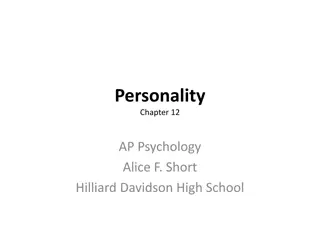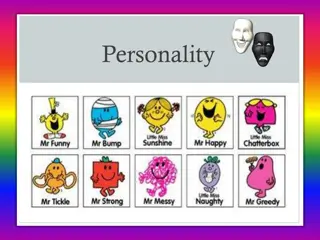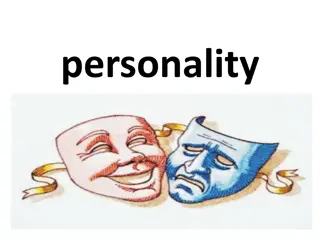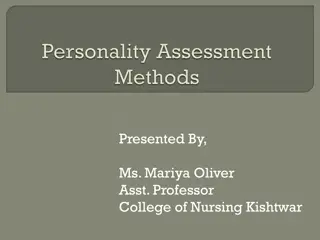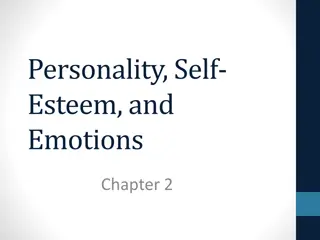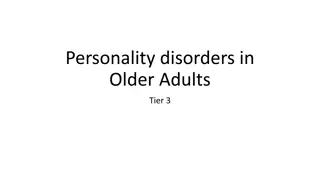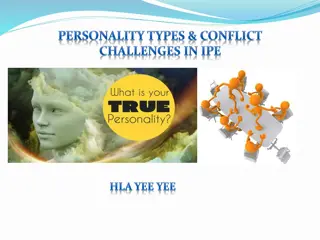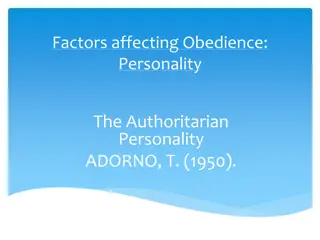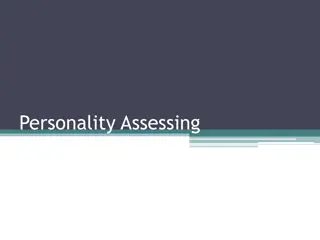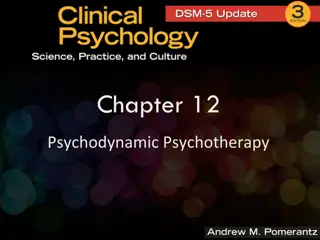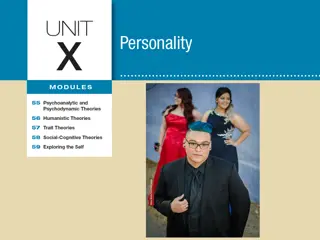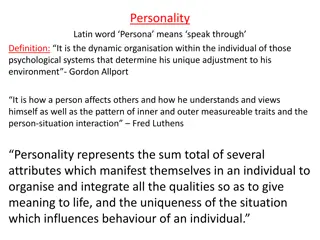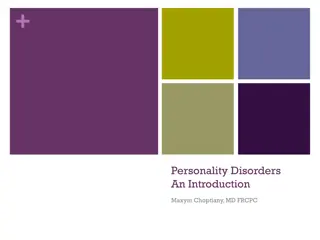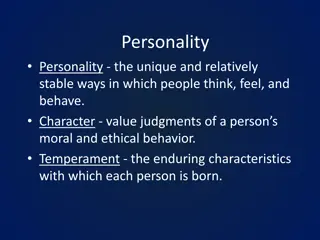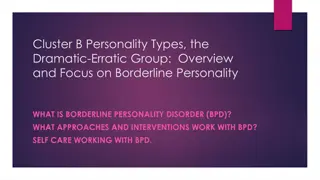Overview of Freud's Psychodynamic Theories of Personality
This content delves into Freud's psychodynamic theories of personality, highlighting the ID, Ego, and Superego as key components. It discusses how early childhood experiences shape adult personality, the functions of each structure, and how they interact to influence behavior. The concept of defense mechanisms is also explored, emphasizing the need for balance among these structures for optimal psychological functioning.
Uploaded on Sep 16, 2024 | 0 Views
Download Presentation

Please find below an Image/Link to download the presentation.
The content on the website is provided AS IS for your information and personal use only. It may not be sold, licensed, or shared on other websites without obtaining consent from the author. Download presentation by click this link. If you encounter any issues during the download, it is possible that the publisher has removed the file from their server.
E N D
Presentation Transcript
Theories of Personality Chapter 2
Psychodynamic Theories of Personality Section 1
Freud and Psychoanalysis Emphasizes the movement of psychological energy WITHIN a person Assume adult personality (and problems) are formed by experiences in early childhood Experiences produce unconscious thoughts which later form HABITS and self-defeating behavior
Structures of Personality (3): ID Present at birth and is totally UNCONSCIOUS GOAL: avoid pain / obtain pleasure Bodies needs, wants and desires Energy is released by uncensored mental images / unbidden thoughts The ID may tell you to take $ that isn t yours bc you want new shoes
Ego (2ndsystem to emerge) The REFEREE (balance) between instinct (id) and demands of society (superego) Puts a rein on the ID s desire for SEX and AGGRESSION Will allow these desires to happen in an appropriate environment Attempts to use reason and good sense
Superego (last system to develop) Moral system / essentially your CONSCIENCE Judges the ID Good feelings of PRIDE for good behavior or decisions Bad feelings of GUILT for bad behavior or decisions
Example Situation: Do Not Copy Situation: A girl has been in a serious relationship for 2 years. Another boy texts her and tells her he likes her. She has a natural attraction to this boy but has a decision to make ID: Would tell her It s ok, you can begin texting and flirting with him back, its not big deal. Besides, I m not married or anything Superego: Would tell her This is a slippery slope and can t lead to anything good. You have a good relationship and this will only cause trouble
Balance and Defense Mechanisms Systems need to be BALANCED If ID is too strong we give into impulse and selfish desires If SUPEREGO is too strong we too rigid, moralistic and bossy We have 6 defense mechanisms that protect us from conflict
Section 1 Review: 1. Where did FREUD assume most adult personality traits were formed? 2. What is the major GOAL of the ID? 3. What system develops 2nd? What is its job? 4. When does the SUPEREGO develop? What is its job?
Defense Mechanisms Section 2
1. Repression Threatening memory or emotion is BLOCKED from our consciousness A childhood experience you say you can t remember The experience is so traumatic we can t get over it so we force ourselves to forget Ex. I almost drowned but don t remember / I ve repressed it so I can swim
2. Projection You have anxiety over YOURSELF (messing up) so you place blame onto SOMEONE ELSE Think of a literal projector putting its image onto another screen Ex. Husband is cheating on wife, begins blaming his wife for cheating on him (projects his guilt onto her)
3. Displacement DIRECTING your emotions towards people or objects that are not the cause of their feeling Your anxiety is coming from SOMEONE ELSE (usually with power over you) boss, parents, etc. Ex. Parents yell at you for not doing the dishes so you scream at your younger brother for distracting you
4. Reaction Formation Unconscious anxiety about a person or thing turns into the OPPOSITE feeling This new feeling is the minds way to allow you to be around people or things that probably have hurt you Ex. An abused wife convinces herself she loves her husband Ex. A child curses his father so he buys the child ice cream
5. Regression REVERTING back to a previous phase of psychological development (acting childish) Ex. My Iphone is acting up so I throw it off the ground (tantrum)
6. Denial REFUSAL to believe something UNPLEASANT is happening Protects your self image Ex. Alcoholic or drug addict won t admit they have a problem
Oedipus Complex / Psychosexual Stage Claims children unconsciously wish to possess parent of the opposite sex Also want to get rid of parent of the same sex I m going to marry mommy / daddy when I grow up Named after Oedipus who killed his father to marry his mother
Section 2 Review: Pick a Defense Mechanism 1. As I child I broke my leg on a bike, my mother tells me the story but I can t remember. 2. My children have been misbehaving at school, I blame myself and decide to buy them a new video game. 3. My internet is working slow and I can t finish my project so I punch the wall. 4. I regularly gamble away my paycheck. I tell myself I deserve to have fun so its ok and keep the bad habit up.
Other Psychodynamic Approaches Section 3
Archetypes A typical example of something Usually based off examples of things from our culture Ex. Witch = Evil Red = blood or bad Light = hope or goodness
Object-Relations School Developed in Great Britain by Melanie Klein Central problem in life is to find a balance between the need for INDEPENDENCE and the need for OTHERS Based on how we react to 3 types of separations that will be determined by our experiences in the 1styear of life
3 Types of Separations 1. Small: Occur during arguments 2. Moderate: Leaving home for the 1sttime 3. Major: Divorce or death
Evaluating Psychodynamic Theories (3) 1 Violating the Principle of Falsifiability: Many theories about the unconscious are impossible to confirm (or disconfirm) Ex. We have certain IDEAS about why we dream about certain things, but its impossible to test
2. Drawing Universal Principles From the Experiences of a Few Freud and others generalized from the therapy sessions from only a few patients Can t OVERGENERALIZE from small samples Psychologists should study samples of other findings as well
3. Basing Theories of Personality Development on the Fallible Memories of Patients Most psychologists have not observed their patients as CHILDREN Often they study the patients as ADULTS and have them work their memories backwards towards childhood Memory is often inaccurate and influenced by our current lives Ex. If you are upset with your mother now, you may only recall times she was hard on you
Section 3 Review: 1. What did the OBJECT RELATIONS school claim was the central problem of life? 2. Describe the 3 types of SEPARATIONS. 3. What is the major PROBLEM of FREUD s theories? 4. When do most psychologists study their patients?
The Modern Study of Personality Section 4
Popular Personality Tests More than 2,500 tests have been created to help predict personality May look for: Tendency to steal, take drugs, or be disloyal on the job Most have proven to be USELESS Generally HALF the people score differently only 5 weeks later on same test
The Big 5 Personality Traits Extroversion Outgoing Introversion Shy Silent Talkative Reclusive Sociable Cautious Adventurous Likes the Shadows Likes the Limelight
Negative Emotionality Anxiety Emotional Stability Less anxiety Inability to control emotions; Ability to control most negative emotions Anger, guilt, resentment Worries and complainers Try to look at the glass as half full See the sour side of life
Agreeableness Good natured Antagonism Irritable Cooperative Abrasive Secure Jealous Mostly friendly relationships Hostile relationships
Conscientious Responsible Impulsive Undependable Determined Quick to give up Tidy Careless Self discipline Picky
Openness to Experience Curious Resistant to New Experiences Predictable Creative Conforming Imaginative Unimaginative
Section 4 Review: 1. What are some tendencies personality tests look for? 2. Explain the difference to an INTROVERT and an EXTROVERT. 3. A person that is both IRRITABLE and JEALOUS would be considered to have which personality trait? 4. Give an example of a person that may be OPEN TO EXPERIENCE.




